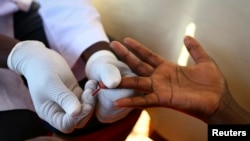Scientists have isolated potent HIV antibodies — immune system fighter proteins targeted specifically against the virus — that have implications for the prevention and even destruction of the virus that causes AIDS.
The powerful, broadly neutralizing antibodies are produced by an extremely small, “elite” group of HIV-positive individuals. The antibodies have kept them alive and in some cases thriving for many years without the use of antiretroviral drugs.
Scientists have harnessed these super antibodies, which recognize and disarm many different strains of HIV, and have mass-produced them with the aim of giving them to normal HIV patients.
Using the latest technology to cull and replicate the most potent antibodies, researchers tested the neutralizing proteins in a group of 13 individuals. All of the participants had been on antiretroviral drugs for a long time.
Antiretrovirals suppress HIV, but don't kill certain cells that act as reservoirs and harbor the virus. That means the virus can roar back to life when the drugs are stopped, in a process called viral rebound.
Writing in the journal Nature, the researchers said that among people who did not receive the new antibody, called 3BNC117, viral rebound occurred in about two and a half weeks. Those who did receive it were able to delay rebound by as long as almost 10 weeks in some cases.
'Kick and kill'
Michel Nussenzweig of Rockefeller University in New York, a corresponding author of the study, said 3BNC117 might one day be able to destroy the virus that causes AIDS.
“People have thought for a long time that one way to think about a cure strategy would be to do something called 'kick and kill' — that is, to activate the viruses that are in the latent reservoir and then use an agent like an antibody, for example, that would be able to see the activated cells that are starting to produce the virus and kill them,” Nussenzweig said.
Nussenzweig and colleagues are planning experiments using a cancer drug that unmasks the virus hidden in reservoir cells, and then killing them with 3BNC117.
One of the benefits of the antibody is that it doesn’t seem to have any side effects, according to Nussenzweig.
“They were made originally by human beings and we have not modified them at all," he said. "So they are completely natural products and should not have major side effects. In fact, the people who received them so far — and it’s a small number — have not reported any significant problems.”
Nussenzweig said a large clinical trial in Africa, using a similar neutralizing antibody developed by the vaccine center at the National Institutes of Health, is underway to see whether injections of the protein can protect women at risk of infection.




